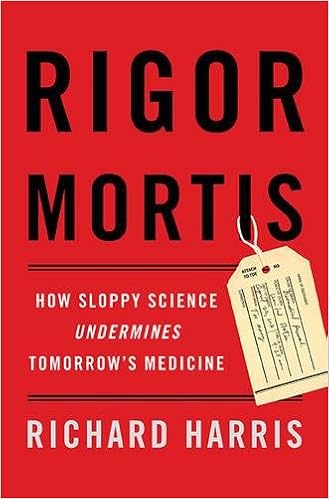 A review of Richard F. Harris Rigor Mortis: How Sloppy Science Creates Worthless Cures, Crushes Hope, and Wastes Billions by Marcus Munafò at Nature:
A review of Richard F. Harris Rigor Mortis: How Sloppy Science Creates Worthless Cures, Crushes Hope, and Wastes Billions by Marcus Munafò at Nature:
Harris introduces us to the growing field of metascience — the scientific study of science itself — and some of those working in it. These reproducibility firefighters are providing answers to such empirical questions, and identifying interventions. Robert Kaplan and Veronica Irvin at the US National Institutes of Health (NIH) showed that when the National Heart, Lung, and Blood Institute required preregistration of primary outcomes (the main outcome against which success should be judged) in clinical trials, the proportion of studies reporting a benefit fell from 57% to 8%.
That’s the good news. The bad news would have been perpetuating the errors.
Failure is a normal part of science, but dressing it up as success (for example, by presenting a secondary outcome as the primary outcome) is misleading. So is packaging exploratory, hypothesis-generating work as confirmatory, hypothesis-testing work. Unfortunately, with few ways to publish negative results, such practices are encouraged by incentives to present clean results with a compelling narrative, and be the first to do so. More.
Wouldn’t be nice if the Marches and teach-ins were about issues like replication failure?
How many of those people stop and think what it would be like to be fighting cancer and to discover that billions of our tax dollars have been wasted on ineffectual research? Oh and, if we complain, we “hate science.”
Keep up to date with Retraction Watch.
See also: For better science, let’s dismiss the rubbish that “science is self-correcting” in principle Self-correction is a rational human choice; it is not inherent in any enterprise whatsoever.
Peer review “unscientific”: Tough words from editor of Nature
Crisis in replication
and
Marchin’, marchin’ for Science (Hint: the problems are back at your desk, not out in the streets)
Follow UD News at Twitter!